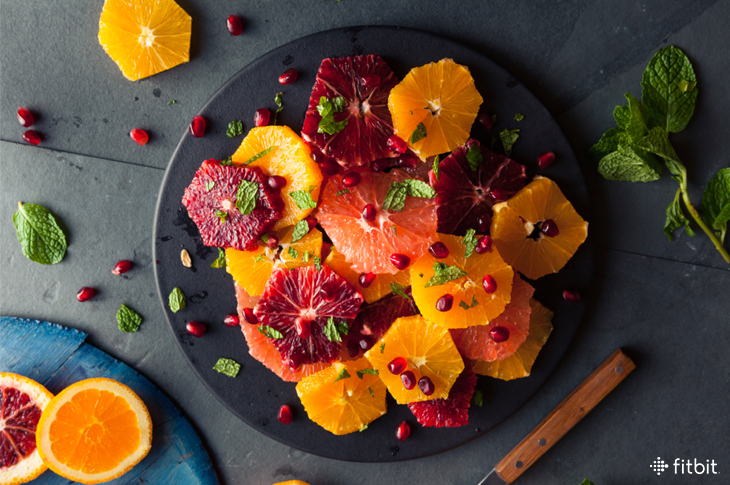
You may have heard that sugar is the new fat. The new Dietary Guidelines for Americans cracked down on sugar, limiting it to no more than 10 percent of your total daily calories. The World Health Organization went one step further, suggesting you aim for less than 5 percent for added health benefits. Weight lifters and other athletes worry that it’s not supporting their workouts. Fad dieters and sugar haters tell you to ditch it entirely. For some good scientific reasons and a host of other speculations, many people are trying to completely scrub sugar out of their diets. But taken to the extreme, if you “quit” sugar, does that also mean you have to give up fruit?
As controversial as this may be for some (sorry, Paleo lovers!), there’s no escaping the fact that the body’s favorite source of fuel for the brain and muscles is carbohydrates—including sugar. And just as there are healthy and unhealthy fats, you can find healthy and unhealthy sources of sugar.
Fruit is nature’s very own candy. The sugar naturally occurring in fruit (along with vegetables and dairy), is considered healthy because of the company it keeps—fruit provides more than just sticky-sweet calories, but also disease-fighting essential vitamins, minerals, antioxidants, phytonutrients, water, and most important, fiber.
Fiber takes time to chew and is filling, making it hard to eat too much fruit at one time. For example, one cup of strawberries has the same amount of sugar as 10 jelly beans! But 10 jelly beans aren’t exactly going to fill you up, are they? The fiber in fruit not only takes up space in your stomach, it also attaches itself to the sugar, which helps to slow down how quickly it’s delivered into your bloodstream and liver. So your body is able to deal with the sugar in a more controlled way, putting less strain on your liver.
What you want to watch out for is “added” sugars (like sucrose, glucose, and fructose to name a few) found in huge amounts in processed foods and drinks, or “free” sugars like honey, syrup, and fruit juice. These “added” and “free” sugars provide little in the way of essential nutrients, and can add up quickly in your day.
Eating too much added sugar for too long can lead to weight gain, which in turn can lead to more serious conditions like diabetes, heart disease, and liver disease. But the case is different with fruit. A 2013 study published in the British Medical Journal compared the impact of “healthy” versus “unhealthy” sugar: Eating more blueberries, grapes, and apples was linked to a much lower risk of type 2 diabetes, whereas drinking more fruit juice was linked to a higher risk.
Still wondering exactly how much sugar there is in fruit? Some fruits are higher in sugar compared to others, like bananas, which seem to be getting a lot of attitude from trainers. But if you take a close look at the numbers, it isn’t a huge range.
Fruit Low in Sugar:
- Raspberries, 5 g per cup
- Strawberries, 7 g per cup
- Apricots, 7 g per 2 apricots
- Cantaloupe, 8 g for 1 large wedge
- White grapefruit, 9 g per half a fruit
Fruit High in Sugar:
- Mango, 23 g per cup
- Apple, 19 g for 1 medium fruit
- Cherries, 18 g per cup
- Banana, 17 g for 1 large fruit
- Grapes, 15 g per cup
And before you start avoiding fruit that’s “high” in sugar, keep it in perspective! It’s shocking to see how even the sweetest fruit stacks up against a serving of these packaged foods.
Processed Treats High in Sugar:
- 1 king-size (4 oz/125 g) bag bite-size fruit candies, 87 g
- 1 large (16 fl oz/500 ml) caramel blended coffee, 67 g
- 3 chocolate cream-filled snack cakes, 57 g
- 1 large (16 fl oz/500 ml) bottle of cola, 49 g
- 1 old-fashioned glazed doughnut, 30 g
Yes, fruit contains sugar, but far less than what you’ll find in the real sweet villains—processed foods. And fruit delivers a host of health-enhancing goodies you simply can’t get from candies, cookies, or juice. Aim for 1½ to 2 servings—of fresh, whole fruit per day.
Are you a fan of fruit? Or do you skip it to avoid the sugar? Join the conversation below.
This information is for educational purposes only and is not intended as a substitute for medical diagnosis or treatment. You should not use this information to diagnose or treat a health problem or condition. Always check with your doctor before changing your diet, altering your sleep habits, taking supplements, or starting a new fitness routine.

Where did you get /the fact/ “that the body’s favorite source of fuel for the brain and muscles is carbohydrates—including sugar.”?
When I’m on a primarily carbohydrate based diet I run out steam when running for over 2 h. On ketones I can easily go w/o refuelling for 4 …
I’m not discarding the article as a whole, but that statement above is an opinion. Totally agree on different qualities of carbohydrate foods, and differences between fruit and processed (added) sugars.
Cheers
Andrej
I am a huge fruit lover. I eat about five servings of fruit a day. Mangoes are my favorite snack. I acknowledge that sugar is a problematic nutrient in foods, but I do not eat any other sugar-filled foods, like sodas, desserts, and candy-snacks. I find that the sugar in fruits satisfies my sweet tooth, and also keeps my hunger in check. I really do not care how much sugar is in fruits; I say the good far outweighs the bad and if I need the nutrients and calories, I shouldn’t have to feel guilty about my favorite snack.